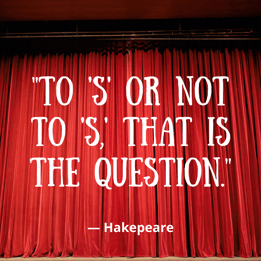And other words that don’t (or sometimes do) need an “s”

Who knew a single letter could cause so much confusion? Here are five pairs of words that cause eyebrow furrowing for English speakers and writers. Learn when to keep the “s” and when to toss it with these brief explanations and helpful examples.
Beside vs. Besides
Both are valid and both are correct, in certain cases.
Use “beside”:
- As a preposition.* If you sit beside me at lunch, I might steal your pudding.
Use “besides”:
- As a preposition (with a different meaning).** There’s nothing to eat besides pudding.
- As an adverb. I don’t want pudding, and besides, it expired in 2005.
- As an adjective. Besides eating expired pudding, what other things can we do?
Toward vs. Towards
“Towards” is an acceptable variant of “toward” in the United Kingdom and Australia. It’s less acceptable but still commonly used in spoken U.S. English. When you think about it, the “s” serves no purpose and has no meaningful (etymological) basis. So, we recommend sticking with “toward” in all instances:
- As a preposition. Lean toward me, and I’ll whisper the location of my secret unexpired pudding stash.
- As an adjective. The use of “toward” as an adjective is, similar to the expired pudding, old and somewhat weird. The sailor took advantage of the toward breeze and sailed to the Isle of Pudding that afternoon.
Anyway vs. Anyways
“Anyways” is the sloppy younger brother of “anyway.” In speech, you’ll sail by when using this informal variant. In writing, we recommend using the correct form, “anyway,” in all instances:
- As an adverb. We can’t get to your secret food stash anyway; your mom locked the basement door.
- Unless, what you were really trying to do was sing “Any Way You Want It” by Journey or say something similar to “Any way you look at it, he is horrible with directions and terrible at making pudding.” In these cases, you’ve broken the compound into two parts.
Backward vs. Backwards
“Backward” is a variant of “backwards;” more specifically, the former is used in U.S. English and the latter is used in the U.K.
Allowing for the fact that ProofreadNOW.com is based in the United States, we leave off the “s” in all uses when we are not proofing British text:
- As an adverb. What if we hold the pudding and walk backward 16 steps while chanting, as a way to reverse time and make it edible again?
- As an adjective. That kind of backward thinking is why I love you…and why you are failing school.
- As a noun. Though this use is also archaic, we couldn’t help but mention that Shakespeare used “backward” as a noun. He didn’t write about expired pudding that we know of. What a pity.
Forward vs. Forwards
This is another case of context. Both forms can be correct but not at the same time.
When “forward” needs an “s”:
- As a plural noun. More specifically, when referring to strikers in football/soccer. The forwards scored three brilliant goals during Saturday’s game, while eating pudding.
- As a verb. The third-person conjugation of the present-tense verb form of “forward.” She forwards her mail whenever she goes on vacation, so it doesn’t languish in her mailbox like old pudding.
When it doesn’t need an “s”:
- As an adjective. We need to exercise more forward thinking, so we don’t end up with nothing to eat but expired pudding the next time.
- As an adverb. From this time forward, I will check the expiration date on my pudding.
- As a verb. The other conjugations of the verb form “forward.” Whenever I go on vacation, I forward my mail, which consists of expired pudding pails and bills.
If the use of “adjective,” “adverb,” “preposition,” and the like has you in a tizzy, have no fear. You’re not alone. We’ll be covering these, called “parts of speech,” in an upcoming blog post.
In the meantime, check out the highlighted links in this post or search our blog for more related posts to feed your grammar hunger.
*Definitions referenced from Merriam Webster.
**“Beside” as a preposition versus “besides” as a preposition.




